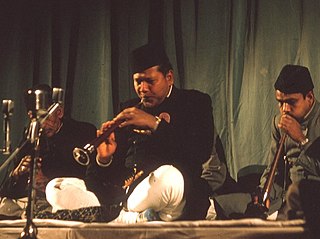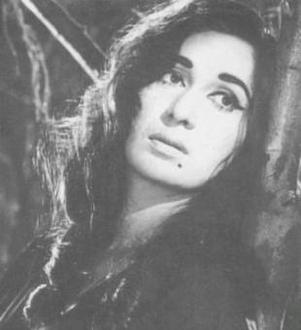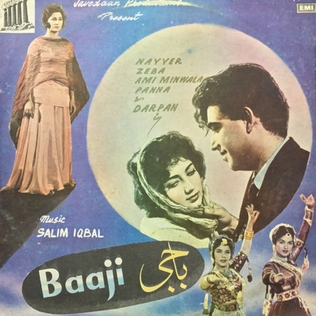Related Research Articles

Georges-Henri Denys Arcand is a Canadian filmmaker. During his four decades career, he became one of the most internationally-recognized director from Quebec, earning widespread acclaim and numerous accolades for his "intensely personal, challenging, and intellectual films."

Claude Sautet was a French film director and screenwriter.

Ustad Bismillah Khan, often referred to by the title Ustad, was an Indian musician credited with popularizing the shehnai, a reeded woodwind instrument. He played it with such expressive virtuosity that he became a leading Hindustani classical music artist. His name was indelibly linked with the woodwind instrument. While the shehnai had importance as a folk instrument played primarily by musicians schooled in traditional ceremonies, Khan is credited with elevating its status and bringing it to the concert stage.
Shoaib Mansoor, is a Pakistani television and film director, writer, producer, lyricist and musician of Muhajir origin.

Ustad Allauddin Khan, was an Indian sarod player and multi-instrumentalist, composer and one of the most notable music teachers of the 20th century in Indian classical music. For a generation many of his students, across different instruments like sitar and violin, dominated Hindustani classical and became one of the most famous exponents of the form ever, including his son Ali Akbar Khan.

Khwaja Khurshid Anwar was a Pakistani filmmaker, writer, director and music composer who earned recognition in both India and Pakistan. He is credited as being one of the most original and inventive music directors of his generation. He was the Programme Producer (Music) at (AIR), All India Radio or Akashvani, Delhi in 1939.

Ahmed Rushdi was a versatile Pakistani playback singer and was "an important contributor to the golden age of Pakistani film music." Regarded as one of the greatest singers in South Asia who could sing high tenor notes with ease, he is best known for his versatility and distinctive voice, with complex and dark emotional expressions. Considered as the first pop singer of South Asia, he sang South Asia's first pop song, "Ko Ko Korina", in the 1966 film Armaan.
The Prix Iris is a Canadian film award, presented annually by Québec Cinéma, which recognizes talent and achievement in the mainly francophone feature film industry in Quebec. Until 2016, it was known as the Jutra Award in memory of influential Quebec film director Claude Jutra, but Jutra's name was withdrawn from the awards following the publication of Yves Lever's biography of Jutra, which alleged that he had sexually abused children.

Sohail Rana is a Pakistani music composer for films and television. He was introduced by actor Waheed Murad in Pakistan film industry and gained popularity when singer Ahmed Rushdi sang his compositions in such films as Armaan and Doraha. He is now based in Canada.

Arthur Nayyar, commonly known as A. Nayyar, was a Pakistani film playback singer.
Pierre-Yves Borgeaud is a Swiss film director. Borgeaud has a bachelor's degree in arts at the Lausanne University in 1990, with a thesis about the influence of jazz on French writers. He has worked as an independent journalist, writing about music and moving images in different media. He also played the drums in jazz and funk bands and worked as a music producer.

André Barsacq was a French theatre director, producer, scenic designer, and playwright. From 1940 to 1973 he was the director of the Théâtre de l'Atelier. He was the brother of Russian production designer Léon Barsacq and the uncle of film actor Yves Barsacq.
Adam Nayyar was a Pakistani anthropologist, author and ethnomusicologist. He served the Lok Virsa for twenty years as a Director Research. He was the acting executive director of Pakistan National Council of the Arts (PNCA) when he died.

Nayyar Sultana, known as Malka-i-Jazbaat and Queen of Emotions, was a Pakistani film actress. She became one of the foremost screen actresses of Lollywood in the 1950s and 1960s.
Anwar Kamal Pasha, was the pioneer in the Pakistan film industry and an early Pakistani film director and producer from Lahore, Pakistan.

Na Maloom Afraad 2 is a 2017 Pakistani action comedy film, co-written and directed by Nabeel Qureshi and produced by Fizza Ali Meerza and Mehdi Ali. It is a sequel to Na Maloom Afraad (2014). The film stars Fahad Mustafa, Javed Sheikh, Mohsin Abbas Haider and Urwa Hocane reprising their roles from the previous film. New additions to the cast include Marina Khan and Hania Amir. While Nayyar Ejaz, Saleem Meraj and Nazr-ul-Hassan played the main antagonists.
Pierre Gang is a Canadian film and television director, best known for his 1996 feature film Not Me! (Sous-sol) and the television miniseries More Tales of the City and Further Tales of the City.
Marie-Hélène Cousineau is a Canadian film director and producer. Originally from Quebec, she moved to Igloolik, Northwest Territories in 1990, where she became a co-founder of the filmmaking collective Arnait Video Productions.

Baaji is a 1963 Pakistani musical romance film directed by S. Suleman. The film features Nayyar Sultana in the title role with Darpan, Zeba, Agha Talish and Lehri in pivotal roles. The music of the film's soundtrack was composed by Saleem Iqbal. Baaji depicts the frustrations of a young widow due to her increasing age.
Khawaja Najam ul Hasan(Urdu:خواجہ نجم الحسن ; born 4 October 1949) is a prominent television Producer/Director/Trainer and one of the pioneers of television in Pakistan since television was first introduced in the country in 1964.He has been decorated with many awards including best TV producer for Moods and Melodies in Singapore and the Pride of Performance award by the President of Pakistan in 2005.
References
- ↑ "Dr Adam Nayyar passes away -DAWN - National; July 30, 2008". DAWN. 2008-07-30. Archived from the original on December 2, 2008. Retrieved 2010-10-09.